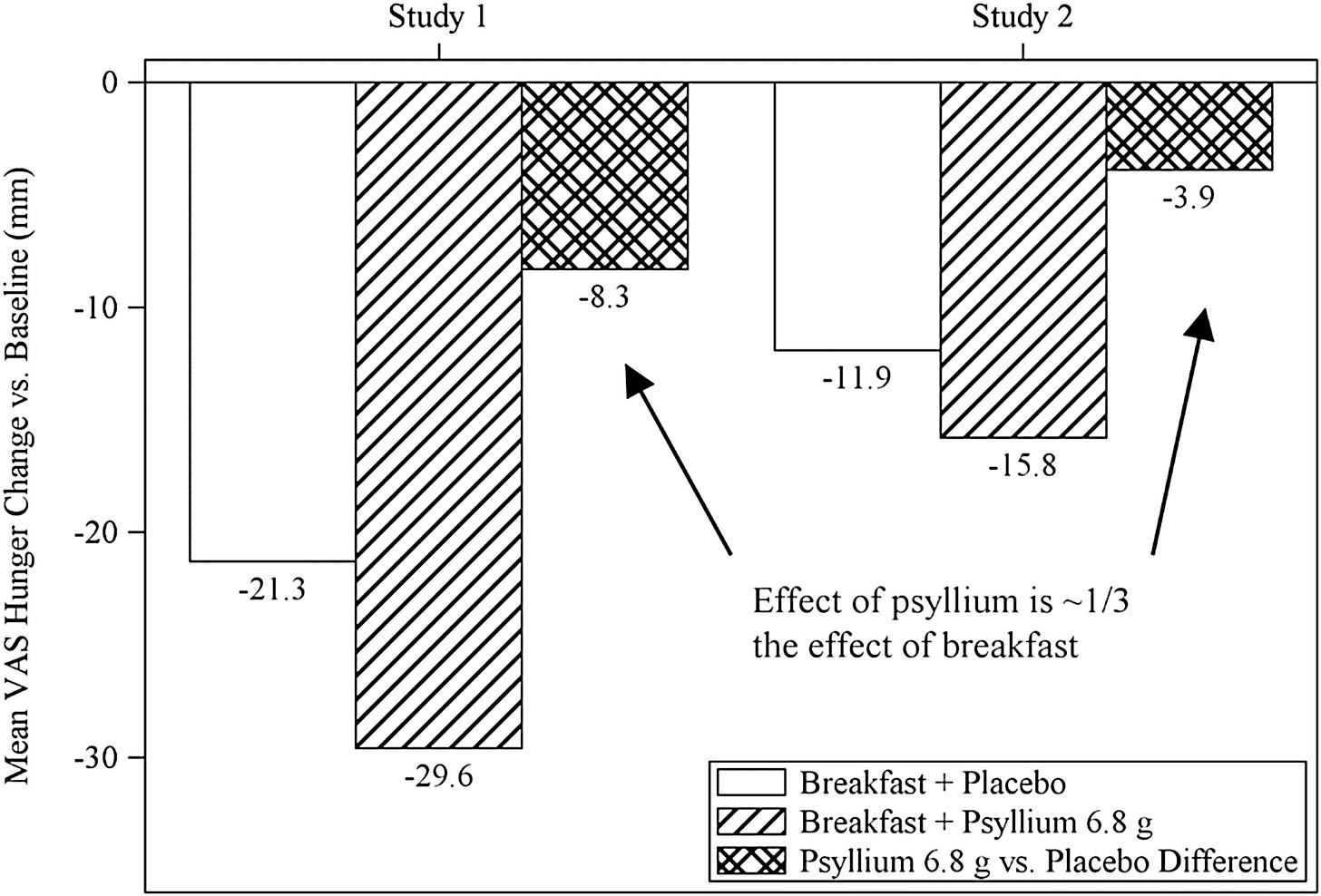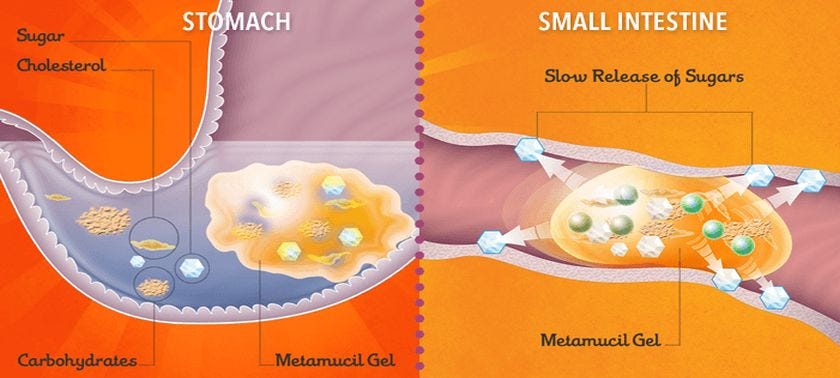Psyllium Husk: The Supplement You're Probably Ignoring (But Shouldn't)
How This Evidence-Based Fiber Lowers Blood Sugar, Drops Cholesterol, and Helps Shed Pounds
Humans evolved eating diets rich in fiber; up to 100 grams a day. Today, most people barely reach 15 grams. This drastic reduction isn't innocent; it has implications for our digestion, metabolism, and heart health. But getting enough fiber with contemporary diets may not be easy or practical for many.
One supplemental fiber stands out for its profound and scientifically studied benefits: psyllium husk. Derived from the seeds of the Plantago ovata plant, psyllium uniquely combines soluble and insoluble fibers, forming a gel-like substance when mixed with water, leading to an array of health benefits. Here’s the science-backed breakdown of why psyllium deserves a spot in your daily routine.
Blood Sugar and Weight Control
A compelling 8-week randomized trial of 40 adults recently diagnosed with type 2 diabetes demonstrated psyllium’s amazing benefits for metabolic health. After one week on a standardized diet, half the group added 10.5 grams of psyllium daily (7 grams before lunch, 3.5 grams before dinner), while the other half maintained their usual diet.
Key Results:
Blood sugar improved quickly: The psyllium group saw fasting glucose drop by approximately 44 mg/dL (2.44 mmol/L), compared to negligible change in the control group.
HbA1c decreased: Psyllium reduced HbA1c by a full percentage point—from about 8.5% to 7.5% while control subjects experienced no significant improvement. This is huge, as a typical target for people with type 2 diabetes (T2DM) is less than 7.0%.
Reduced insulin resistance: Both fasting insulin and C-peptide levels significantly decreased, cutting a measure of insulin resistance roughly in half.
Moderate weight loss: Participants using psyllium lost an average of 6 pounds and reduced waist and hip circumference, whereas controls gained weight slightly.
Overall, this quick and simple supplementation significantly improved metabolic health within just eight weeks.
Cholesterol Management
Multiple meta-analyses confirm that roughly 10 grams of psyllium daily consistently lowers LDL (“bad”) cholesterol. A recent analysis of 28 studies reported average reductions of:
LDL cholesterol by about 13 mg/dL. For context, a meta analysis found that a 38.7 mg/dL (1 mmol/L) lowering in LDL reduced the risk of cardiovascular mortality by about 15%.
Non-HDL cholesterol and Apolipoprotein B also showed significant improvements.
These benefits are attributed to psyllium’s ability to bind bile acids, prompting the liver to use circulating cholesterol to replenish bile reserves, ultimately lowering cholesterol levels in your bloodstream.
Appetite and Satiety
Psyllium is also a great appetite suppressant. In controlled trials involving healthy adults, psyllium consistently curbed hunger and increased feelings of fullness, even with calorie-restricted meals. Volunteers who consumed about 7 grams of psyllium before meals reported significantly reduced appetite (~30% reduction in hunger) and increased fullness throughout a four-hour window.
This appetite suppression was dose-dependent and evident even when meal sizes were reduced. Psyllium’s gel-forming nature slows stomach emptying, enhancing feelings of satiety and reducing cravings between meals.
Digestive Health: Relief from Constipation and IBS
Psyllium is well-known for its powerful digestive benefits, particularly for relieving both constipation and diarrhea and easing symptoms of Irritable Bowel Syndrome (IBS). Moreover, psyllium acts as a prebiotic, supporting beneficial gut bacteria and promoting a healthier microbiome environment, potentially providing long-term benefits beyond immediate symptom relief.
Heart Health and Blood Pressure
A systematic review pooling 11 clinical trials involving nearly 600 adults found psyllium modestly but consistently lowered systolic blood pressure by about 2 mmHg, particularly in individuals already diagnosed with hypertension. This effect was significant enough to suggest considering psyllium as a safe adjunctive therapy for blood pressure management, especially beneficial in those with elevated cardiovascular risk. This is a relatively small decrease, but beneficial nonetheless.
How Does Psyllium Work?
Viscosity and Gel Formation: Psyllium’s gel-like consistency slows nutrient absorption, stabilizing blood sugar and prolonging fullness.
Bile Acid Binding: Psyllium lowers blood cholesterol by attaching to bile acids in your gut. This stops the bile acids from being reabsorbed into your bloodstream and instead lets them leave your body through your stool. To replace these lost bile acids, your liver uses up more cholesterol to make new ones, which reduces the cholesterol levels in your blood.
Prebiotic Action: Enhances gut microbiome health, increasing beneficial short-chain fatty acids like butyrate, which promote gut integrity and overall health.
An Evidence-Based Protocol for Optimal Psyllium Use
Daily Dosage: Aim for about 10 grams daily, split into two 5-gram doses.
Timing: Take each dose 5-10 minutes before your largest meals for optimal glycemic and appetite control.
Preparation: Mix psyllium powder with at least a cup of water, consuming immediately. Follow with additional water to ensure hydration.
Introduction: Gradually increase from about 3 grams/day to your desired dose to minimize digestive discomfort.
Hydration: Always maintain proper hydration to prevent intestinal blockage or discomfort.
Source: No need to buy any particular brand like Metamucil, I find the cheapest source at bulk stores.
Safety and Tolerability
Psyllium is generally safe and well tolerated for long-term use (I have been using it daily for years), but consult your healthcare provider if you have pre-existing health or digestive issues or take other medications. It should be taken apart from other medications as may impair absorption, so if you are on medications and want to start psyllium make sure you check with your doctor or pharmacist first. Stay hydrated and increase doses gradually to reduce side effects like bloating. This is not a substitute for professional medical advice.
Final Thoughts
Fiber is not just a supporting nutrient; it is a cornerstone of human health. Yet modern diets fall drastically short, leading to real consequences for our metabolic, digestive, and cardiovascular systems.
Psyllium husk offers a simple and effective solution. Supported by strong clinical evidence, it is one of the few supplements shown to reliably improve blood sugar, lower cholesterol, reduce appetite, and support gut health. I take it every day not because it is trendy, but because it is a natural science-based supplement that helps restore one of the most essential foundations of long-term health.
Thanks for reading. Each week, I share practical, evidence-based tools to improve your health, sharpen your focus, and help you perform at your best. If you found this helpful, consider subscribing to get the next one in your inbox









Super helpful post, Dr. Luu. Thanks for sharing!
Longish story: About 2 months ago my Type-2 wife started on Ozempic.
This move prompted me to contact my doc about Zepbound. In terms of weight alone I'm definitely a candidate. But I've been able to dodge metabolic syndrome. I credit intermittent fasting - thanks to Art deVany, back in '06 - and several years ago took up strength training in a serious fashion.
But weight has been a real problem for not quite 30 years now. So I made a doc appointment. New to this particular health system, the doc ordered basic panels and an insulin test.
Panels all came back fine. A1C is 5.4. But insulin........ fasting insulin was an eye-popping 29. I told doc I wanted Zepbound before there was permanent pancreatic damage. In the follow-up a month later she agreed; panels for her were a mere formality needed for insurance.
In the meantime, after the panels came back I felt like I needed immediate help. I remembered reading this post and that evening I ordered psyllium husk from Amazon. Last Friday was 6 full weeks on the psyllium.
The changes were very quick in coming. I lost 13 pounds in the first 3.5 weeks, though its certainly slowed since then. I wish I had a hard number on how far my insulin has dropped. But I know it has. I very much feel like the Tin Man after he's finally gotten some oil. I just move better. The weight loss alone can't explain it. I'm still a really overweight guy. The dog is not altogether happy; some nights he's laboring to keep up with my brisk pace. I believe there's even a mental improvement.
The doc was thrilled at my quick weight loss but recommended strongly against another insulin measurement. One, insurance would not pay for it, and two she didn't want anything on the record that might give the insurance company pause in considering Zepbound. Both made sense.
In the meantime, today I got a letter in the mail from the pharmacy telling me insurance has approved Zepbound for me. So its probably just another week for me on the psyllium husk. I can't imagine you'd recommend someone on a GLP-1 to continue on psyllium husk.